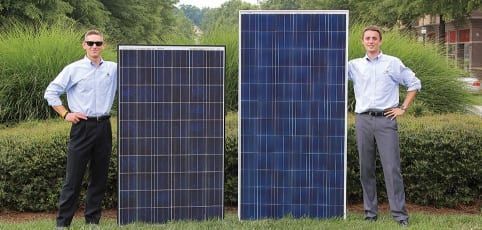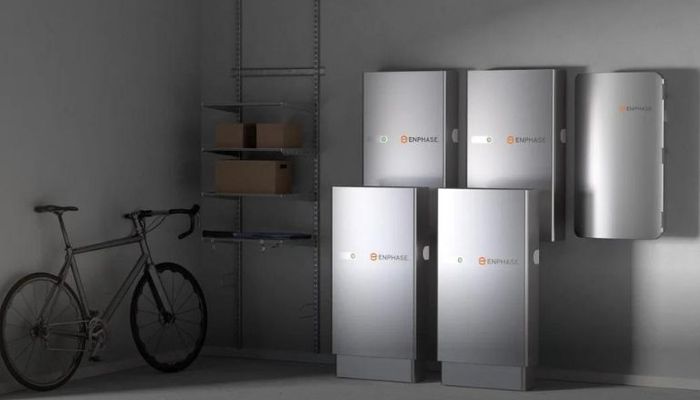60 Cell Vs 72 Cell Solar Panels: What's the Difference?

When shopping for solar panels, you'll encounter two standard sizes for residential and commercial projects: 60-cell and 72-cell solar panels. Both small commercial and residential solar power systems will use one of these two types.
The apparent difference between 60-cell and 72-cell solar panels is the number of cells. 72-cell solar panels have higher wattage than 60-cell solar panels, but this doesn’t necessarily mean better performance.
If you’re deciding whether to use 60-cell panels or 72-cell panels for your solar system, there are a few things to consider. Let’s walk through it.
4 Key Differences Between 60 vs. 72-Cell Solar Panels
1. Size and Dimensions
The most notable difference between 60-cell panels and 72-cell panels is size and weight.
A typical 60-cell panel is 3.5 feet wide and 5.5 feet tall. 72-cell panels are the same width but are much longer — 6.5 to 7 feet — depending on the brand.
The larger 72-cell solar modules are also heavier, weighing almost 50 pounds compared to the 60-cell modules, which are about 40 pounds.
2. Power Output
Solar cells in a panel are typically wired in series. This means that the volts of each solar cell add up to create the total voltage output. Thus, the voltage of a 72-cell panel is higher and will output more watts than a 60-cell solar panel.
3. Efficiency
Efficiency is measured by a solar panel’s ability to convert sunlight into electricity. Newsflash: neither 60-cell nor 72-cell solar panels have an advantage in this department!
If you are shopping around for high-efficiency solar panels, know that they are available in both 60-cell and 72-cell variations. To learn more about the most efficient solar panels today, check out our list here.
4. Cost
There aren’t any significant variations or set rules regarding the cost of 60-cell vs. 72-cell solar panels.
When evaluating solar panels, look at the cost per watt to ensure you’re comparing apples-to-apples with different size panels.
When to Choose 60-Cell vs. 72-Cell Solar Panels
There are no significant pros or cons with 60-cell vs. 72-cell solar panels. But depending on your circumstances, you may want to opt for one size over the other.
Let’s talk about when to choose a 60-cell vs. 72-cell solar panel for your solar power system.
Physical Installation Considerations
If you have limited space for your solar panels, the size of your available area may dictate whether 60-cell or 72-cell panels are best for your installation.
For example, if you are installing solar panels on a roof and have a space that is 12 feet tall, you could install two rows of 60-cell panels but only one row of 72-cell panels. That means installing 60-cell panels will give you a higher wattage system.
If the available area is only 8 feet tall, you would only be able to fit one row of either 60-cell or 72-cell panels. In this case, you could opt for the 72-cell panels to get more output from the entire system.
If you’re installing ground-mount solar, you probably have fewer size limitations. So, most people choose 72-cell panels for ground-mount installations because you can have a higher wattage system with fewer solar panels.
Lastly, another physical consideration is the size and weight of the panels. If you are doing a DIY solar installation and won’t have professional help, you may want to choose 60-cell panels as they weigh less and are therefore easier to handle.
Electrical System Design Considerations
The higher voltage of 72-cell solar modules will make a difference in system design.
If you are using microinverters or DC optimizers, you will have to choose a microinverter or optimizer that can handle the higher voltage of the modules.
If you have a system with a string inverter, you will be able to wire more 60-cell panels in each string due to their lower voltage.
Commercial vs. Residential Project
72-cell panels are ideal for commercial and utility-scale systems, but you can also use 72-cell panels for your residential project. There is no set rule when it comes to solar module size and project type.
Can You Mix and Match 60-Cell and 72-Cell Solar Panels?
Generally, you shouldn’t use both 60-cell and 72-cell panels for one installation. While it’s possible to mix and match, this can make your installation complicated with supporting equipment.
If you choose this route, ensure that you’re only using compatible equipment connected to the same circuit. You also have to verify that the 60-cell and 72-cell solar panels are in separate strings, connected to separate maximum power point trackers for proper performance and efficiency.
A Note on 120-Cell and 144-Cell Solar Panels
While we are discussing cell counts, we should also mention 120-cell and 144-cell solar panels, which are newer additions to the solar industry. These solar panels are made with half-cut solar cells wired into two separate string series.
A 120-cell solar panel is equivalent to a 60-cell panel in terms of physical size and power output, while a 144-cell panel has similar specifications to a 72-cell panel.
Learn more: What is a Half-Cut Solar Panel?
Our Conclusion on 60-Cell vs. 72-Cell Solar Panels
Because 60-cell and 72-cell panels offer the same efficiency, the best choice for you depends on what you need to accomplish for your project. 60-cell panels can be easier to carry and allow for flexible layouts in a limited space. 72-cell panels might make your installation cheaper and faster, and are more useful for ground-mount arrays or large-scale commercial projects.
If you need help picking the right panels for your project, or have any other questions about system design, reach out to us for a free PV design consultation. We'll help you customize a solar kit tailored to meet your needs.






